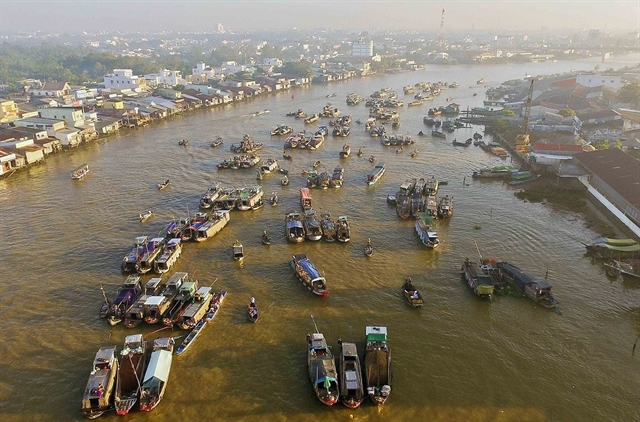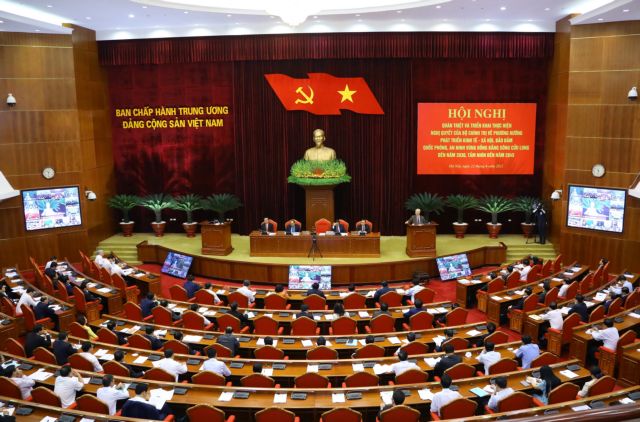
HÀ NỘI — General Secretary of the Communist Party of Việt Nam Nguyễn Phú Trọng has called for joint efforts to drive the growth of Mekong Delta and augment the prosperity and development of the ‘land of the nine dragons’ river.’
He made the remark while chairing the Politburo’s conference held in Hà Nội on Friday, on the implementation of the 13th-tenure Politburo’s Resolution No. 13 on the orientations for socio-economic development and maintenance of security and defence of the Mekong Delta region until 2030, with the vision towards 2045, which was released earlier this month.
The Mekong River Delta region, part of the southern key economic region, is one of six socio-economic regions of the country, comprising 13 provinces and centrally-run cities with a total area of about 40,600 sq.m., which is roughly 13 per cent of the natural land area of the country. Of which, there is about 1.5 million ha of the most fertile rice fields in our country and in the world. The region's population is about 17.5 million people, accounting for nearly 18 per cent of the country's population.
The Mekong River Delta region boasts many potentials and advantages for development and is one of the largest, most fertile plains in Southeast Asia and the world. It is the country’s largest producer and exporter of food, aquatic products, and fruits – contributing about 50 per cent of rice output, 95 per cent of rice exports, nearly 65 per cent of aquaculture production, 60 per cent of fish exports and nearly 70 per cent of all fruits of the country.
This is an area with a system of interlaced rivers, canals and many large orchards and forests, four biosphere reserves, national parks, and nature reserves recognised as a Ramsar Site of the world.
At the same time, the region also has a lot of potential in oil, gas and renewable energy such as wind energy, solar energy, tidal energy, etc.
The Mekong Delta is also rich in history, traditions, and revolutionary heroism, with unique cultural features and unique “river-based civilisation”, such as the widespread use of boats to move about. Rural settlements are dependent on the system of canals, living with floods, and different methods of resource exploitation during the dry and the flooding seasons.
Good implementation of the Politburo’s resolution is expected to help the Mekong Delta region ‘stand on its own strengths’ and grow even faster in the future.
Party leader Trọng said every official must fully grasp the depth of the meaning and agenda and items of the resolution, to foster a high degree of consensus and political will in the implementation, from the central to local levels.
“It must be said that this is a responsibility of the entire political system, not just a sole responsibility of any single region or locality in the Mekong region. We also need to fully understand the relations between regional development and national development. All country for the region, and all regions for the country,” he emphasised.
He urged better and effective cooperation with other countries in the sub-Mekong region, especially in the use of the Mekong River’s waste resources.
There is a strong need to promote and enhance patriotism and the aspirations of the Party officials and people in the Mekong region, to better themselves and not rest on their laurels, to strive for higher goals and not settle for the state of inferiority and lesser development and lesser prosperity compared to other localities and regions in Việt Nam, the Party chief noted.
The Mekong Delta region needs to take advantage of support from the central level, and the help and cooperation from other localities in the country – especially the highly developed HCM City and the south-eastern region – to “achieve faster and more sustainable economic growth, attain wealth and abundance,” and aim for a growth rate that is higher than the national average.
The Party chief urged the Government and central-level agencies to strengthen coordination with the Mekong region in developing ‘priority’ policies that are tailored for the region, that help implement the regional master plan in 2021-30 with a vision towards 2045 in a green, sustainable and comprehensive manner, link agricultural development with industrial and service development, urban development and new rural construction, economic development and natural resource management and environmental protection – especially in the response to natural disasters and adaptation to climate change, sea level rise, saline intrusion.

The region needs to step up administrative reform, improve the business investment environment, and effectively attract and use all resources for development investment; prioritise the allocation of the State budget and social resources for investment into and development of key projects that can address regional and inter-regional development problems; and comprehensively develop the region in terms of economy, culture and society in association with ensuring national defence and security in the southernmost part of the country.
Provinces and cities in the region should expedite the development of e-government toward a digital government, economy and society.
"Other than efforts at consolidating the great national unity bloc, the region should also work on building solidarity and friendship between our people and other countries," Trọng said.
He requested that immediately after this conference, based on the Politburo's Resolution and the guidance of the Central Party Committee, agencies and units across the political system of localities in the region need to urgently develop action plans and learning programmes to help strictly implement the Resolution. — VNS